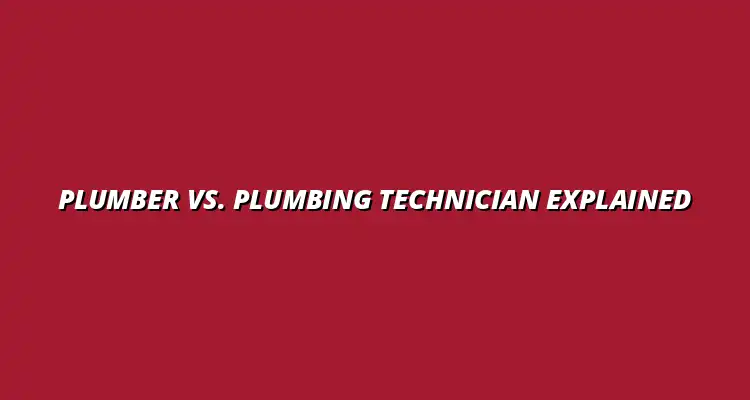
- Beginner Tips
- Feb 18
2025-02-18
Plumbers and plumbing technicians play crucial roles in ensuring our water systems function correctly. Understanding the differences between these two professions can help you know whom to call for specific services. Let’s dive into their definitions and the essential skills they possess!
A plumber is a skilled professional who specializes in installing, repairing, and maintaining piping systems. This includes everything from water supply lines to drainage systems. In many cases, plumbers also handle gas lines, making their expertise vital for both safety and functionality in homes and businesses. For example, understanding residential plumbing systems is fundamental to their work.
To become a successful plumber, certain skills and qualifications are essential. Most plumbers need to complete a formal apprenticeship, which combines hands-on training with classroom education. Here are some key skills and qualifications required:
Having these skills ensures that plumbers can tackle a variety of challenges effectively, from routine repairs to complex installations.
Plumbers are responsible for a wide range of tasks that keep our water systems operational. Common responsibilities include:
These tasks highlight the critical role plumbers play in residential and commercial environments. For example, a plumber might be called to fix water hammer in plumbing.
A plumbing technician, often referred to as a plumbing specialist, focuses more on the maintenance and inspection aspects of plumbing. They may handle repairs but usually work under the supervision of licensed plumbers. This role is essential for keeping plumbing systems running smoothly.
To excel as a plumbing technician, individuals need specific skills and qualifications, typically gained through vocational training. Here are some important skills:
These skills allow plumbing technicians to provide valuable preventive services that help avoid costly repairs down the line. A common task might be to fix a leaky faucet.
Plumbing technicians have a set of tasks that may differ from those of a plumber. Their primary responsibilities often include:
By focusing on these areas, plumbing technicians help ensure that plumbing systems are reliable and efficient. They might also help with a stuck bathroom drain plug.
To become a plumber or plumbing technician, the first step is obtaining a high school diploma or GED. After that, aspiring professionals typically enroll in training programs that can last from a few months to several years, depending on the path chosen. Many opt for vocational schools or community colleges that offer specialized plumbing courses.
In addition to classroom training, hands-on experience is crucial. Most future plumbers and plumbing technicians complete apprenticeships, which allow them to learn under the supervision of experienced professionals. This combination of education and practical work helps build a robust skill set!
Certification and licensing are essential for both plumbers and plumbing technicians. These credentials not only enhance job prospects but also ensure compliance with local codes and regulations. Many states require passing a licensing exam, which tests knowledge and skills related to plumbing systems.
Additionally, obtaining certifications, such as those from the National Center for Construction Education and Research (NCCER), can further bolster a professional’s qualifications. This added credibility can greatly influence hiring decisions. It's always a great idea to check your local licensing requirements! For example, a plumber in Tyseley, Birmingham might need specific certifications. Find a local plumber at this link.
While there is some overlap in the tasks that plumbers and plumbing technicians can perform, there are clear distinctions. Generally, plumbers handle more complex tasks, often involving installation, repairs, and replacements of plumbing systems. Plumbing technicians, on the other hand, typically focus on maintenance and troubleshooting.
It’s essential to understand these differences to ensure you’re hiring the right professional for your needs. For example, plumbing technicians may not be authorized to perform major installation projects or require the same level of licensing as plumbers do!
Many plumbing projects benefit from the collaboration between plumbers and plumbing technicians. For instance, a plumbing technician might conduct routine inspections and basic repairs, while a plumber is called in for more extensive work, like the installation of new piping systems. This teamwork can lead to effective problem-solving and better outcomes for clients.
Understanding these roles helps homeowners know when to seek assistance from each type of professional. In some cases, having both can be advantageous, ensuring comprehensive service for plumbing issues. Teamwork makes the dream work!
When faced with plumbing issues, the complexity of the problem is a key factor in determining whether to call a plumber or a plumbing technician. If the issue involves major leaks, pipe replacements, or complex installations, a plumber is usually the right choice. They have the skills and experience to tackle these intricate tasks effectively.
Some signs that indicate you should call a plumber include:
Hiring a licensed plumber for significant repairs is vital for ensuring safety and compliance. Licensed plumbers are trained to handle complex plumbing systems and have the necessary insurance to protect you from potential damages. Always check for proper licensing before hiring anyone for major plumbing work!
By choosing a licensed professional, homeowners can rest easy knowing their plumbing systems are in good hands. This choice not only assures quality workmanship but also peace of mind.
For issues related to routine maintenance, such as minor leaks or fixture repairs, a plumbing technician is often the ideal choice. They specialize in preventive tasks that can help avoid more significant plumbing problems in the future. Regular check-ups can save homeowners from costly repairs later on!
Some typical tasks plumbing technicians handle include:
Considering the cost-effectiveness of hiring a plumbing technician can lead to significant savings. Routine maintenance is generally less expensive than emergency repairs, making technicians an excellent choice for regular check-ups. Investing in preventive care can ultimately prolong the lifespan of your plumbing systems!
By choosing a plumbing technician for routine maintenance, homeowners can keep their plumbing systems running smoothly and avoid the hassle of emergencies down the line.
Understanding the differences between plumbers and plumbing technicians is crucial for homeowners. Each role holds unique qualifications and responsibilities that cater to specific plumbing needs. By recognizing when to call on each type, homeowners can ensure that their plumbing issues are handled efficiently and effectively!
By keeping this knowledge in mind, you can navigate your plumbing concerns with confidence. It’s about getting the right help at the right time!
When hiring a plumbing professional, consider the following factors:
Choosing the right professional can make a significant difference in the quality of work and your overall experience. Be informed and ask questions to ensure you make the best decision!
Customer reviews and recommendations play a vital role in the hiring process. They provide insights into a professional's reliability, quality of work, and customer service. Before making a choice, take the time to read testimonials and ask friends or family for their recommendations!
By leveraging these resources, you can find a plumbing professional who meets your needs and offers peace of mind. Happy plumbing!
